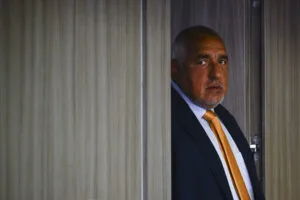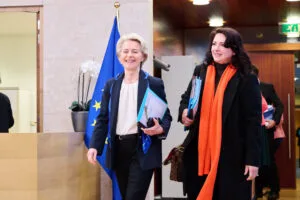Brussels – Bulgaria has been unable for years to find a majority to support a stable government to pull the country out of the political crisis triggered in the spring of 2021. However, it is perfectly capable of finding a cross-party understanding to pass a law banning Lgbtq+ “propaganda” against children, just as in Hungary. As Sofia races to the seventh early election in the past three and a half years, the Bulgarian parliament has given the green light to an amendment to the Education Code the far right presented and controversially backed even by a sizeable share of pro-EU MPs.

The amendment bans “propaganda, promotion, or incitement” of “ideas and opinions” in schools that are of “non-traditional sexual orientation,” that is, contrary to the concept of “emotional, romantic, sexual or sensual attraction between persons of the opposite sex.” The far-right pro-Russian and anti-EU Vazrazhdane (Rebirth) party presented it — backed by the new radical right-wing group in the EU Parliament Europe of Sovereign Nations (ESN) — but surprisingly, at Wednesday’s (Aug. 7) second-reading vote 159 out of 240 MEPs supported it, including not only those of the Bulgarian Socialist Party (which still looks favorably on Moscow) but also of the leading force in the National Assembly, the conservative and pro-EU GERB (Citizens for European Development of Bulgaria) party of former prime minister Boyko Borissov, who is a member of the European People’s Party. Only the liberals from We Continue the Change – Democratic Bulgaria voted against it overwhelmingly, but the opposition stopped at 57.
“It is deeply troubling to see Bulgaria adopting tactics from Russia’s anti-human rights playbook,” the Lgbtq+ rights group Forbidden Colours said, highlighting how “such actions are not only regressive but are also in direct contradiction to the values of equality and non-discrimination that the European Union stands for.” This is precisely why at the EU level a harsh response immediately came from several fronts. “We express dismay and concern” over a law “modeled on the law Putin wanted in Russia” that “violates the founding principles of the EU,” the European Democratic Party (EDP) said. “We call on the Commission to take action for the full respect of individual rights and freedoms guaranteed by the European Treaties.” The same request also came from the EU Parliament, more specifically from the co-chairs of the Lgbtq+ intergroup, Kim van Sparrentak (Greens/Ale) and Marc Angel (S&D), who, in a letter to the president of the EU executive, Ursula von der Leyen, called for “urgent condemnation” of what is happening in Bulgaria, as already done against Hungary.

“The law is a direct attack on the Lgbtq+ community, particularly children,” according to the letter also addressed to the European Commissioner for Equality, Helena Dalli. These types of national “anti-propaganda” laws may put children at psychological and physical risk, “contributing to creating a threatening environment in which Lgbtq+ children may be subject to bullying, harassment, and increased health risks,” she said. At the moment, only vague answers are coming from the EU Commission. “It is still a draft law [only the signature of the President of the Republic, Socialist Rumen Radev is missing, ed.]. We do not comment on pending legislation,” even if the position of the EU executive is to remain “steadfast in our commitment to address discrimination, inequality, and challenges faced by Lgbtq+ individuals,” said Home Affairs spokesperson Anitta Hipper yesterday (Aug. 8). While awaiting a reaction from President von der Leyen, European Economic and Social Committee (EESC) president, Oliver Röpke said: “We are committed to tackling discrimination, inequality, and the challenges faced by Lgbtq+ people. I urge Bulgarian lawmakers to reconsider, for a Union where you can be who you are.”
Before Bulgaria, Hungary
Even before Bulgaria in the summer of 2024, exactly three years ago, a bitter clash on the very issue of Lgbtq+ rights erupted between Brussels and Hungary, with Commission president von der Leyen defining it as “a disgrace” the law of Viktor Orbán‘s government banning homosexuality-related topics in settings that minors attended. The referendum on the anti-Lgbtq+ law, called by the Hungarian premier in July 2021 to find mass support for its initiative, ended in a fiasco on April 4, 2022. While Hungarian voters reconfirmed confidence in the Fidesz party at the last parliamentary elections, they boycotted the referendum: only 44.46 percent cast a valid vote, failing to reach the quorum required to endorse the government’s legislative proposal.
Brussels added pressure after this internal defeat, with an infringement procedure initiated on July 15, 2021, and a ruling from the EU Court of Justice now awaited. Three years ago, the EU executive sent a letter of formal notice to Budapest, giving it two months to respond on the merits. After the reasoned opinion sent to the Orbán government, the EU referred Hungary to the EU Court of Justice on February 13, 2022, since the member country failed to correct its national legislation to address concerns raised by the von der Leyen cabinet about compliance with the founding Treaties of the EU. The European Parliament and 15 member countries — Austria, Belgium, Denmark, Finland, France, Germany, Greece, Ireland, Luxembourg, Malta, the Netherlands, Portugal, Slovenia, Spain, and Sweden — backed the Commission’s lawsuit.
English version by the Translation Service of Withub





